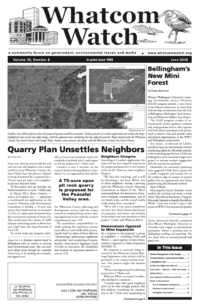by Karlie Kinley
Lummi Nation says the approval of a new marine container terminal at the Port of Vancouver violates the Supreme Court of Canada’s landmark decision in R v. Desautel, which confirmed Indigenous groups in the United States may have protected rights under the Canadian Constitution.
“The expansion of the Port of Vancouver will have devastating impacts on our ability to revitalize our fisheries and exercise our rights,” said Tony Hillaire, chairman of the Lummi Nation. “One-hundred and seventy-seven years ago, Lummi’s access to the land and resources that we relied upon since time immemorial was severed.”
Prior to “Desautel,” Lummi participated in the environmental assessment process for several large infrastructure projects in British Columbia.
“Desautel” confirms that Canada and British Columbia must not only consider the transboundary impacts of proposed projects on Lummi treaty rights in the United States, but also their impacts on Lummi’s unextinguished Aboriginal rights in Canada.
“Desautel confirmed that our rights were not extinguished by the border,” said Hillarie. “Yet, Canada continues to ignore us. The decision to approve the project without engaging in deep consultation with Lummi not only ignores Desautel, but also overlooks the opportunity we have to work together to restore salmon runs on the Fraser River.”
Created in 1846, the United States-Canada border drastically impacted Lummi’s ability to exercise their rights throughout their ancestral territory, which includes Washington’s northernmost coast and southern British Columbia. Since the 1890s, Lummi has continuously battled with both the United States federal government and Washington state to protect and restore their treaty fishing rights. Recent developments in Canadian law, including “Desautel’ and Canada’s commitment to implement the United Nations Declaration on the Rights of Indigenous Peoples, provide Lummi an opportunity to revitalize their rights and restore their fisheries north of the border throughout their traditional waters and homelands, including at Boundary Bay, Roberts Bank, and the Fraser River estuary.
In the past three years, Lummi has intervened twice before the Supreme Court of Canada, first in “Desautel,” and most recently in the Impact Assessment Act reference, which considered the constitutionality of Canada’s new environmental assessment legislation.
“The Lummi are Salmon People,” said Hillaire. “Salmon is integral to our identity, culture, and way of life. The Canadian government does not seem to realize that it is not just Fraser River salmon runs at stake, but our livelihoods and the livelihoods of generations to come.”




























